|
4 Market Square
Dover
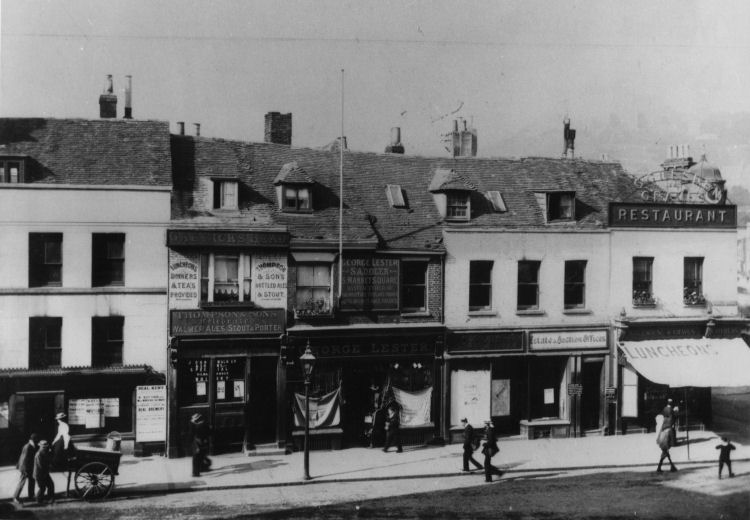 |
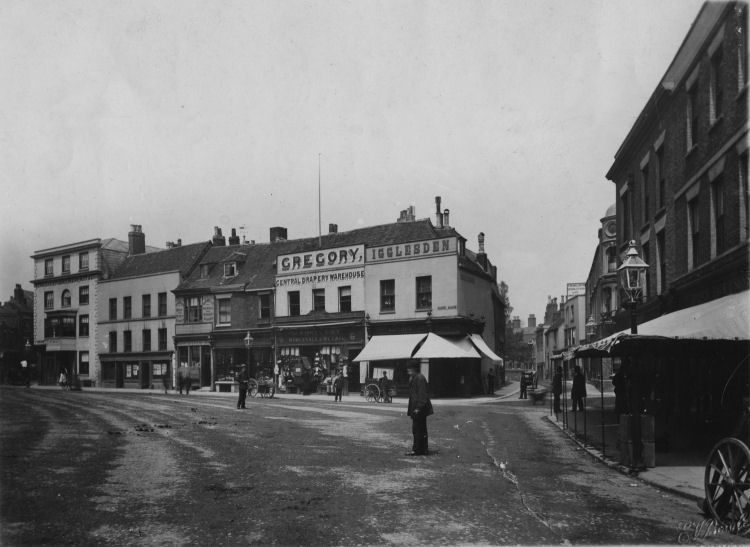
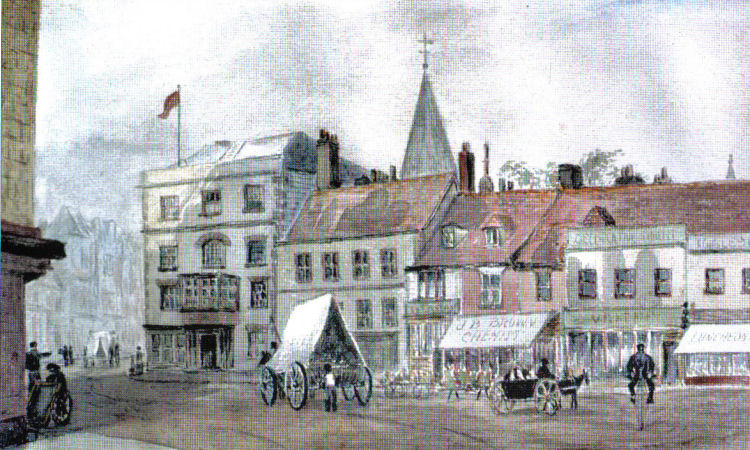
Above shows a watercolour by Fred Kennett of the Market Square in
about 1895. The "City of Antwerp Hotel" is shown on the left next to what
was Worsfolds and Haywards the estate agents and auctioneer for many
years. Next to that is the narrow frontage of the Garrick's Head. |
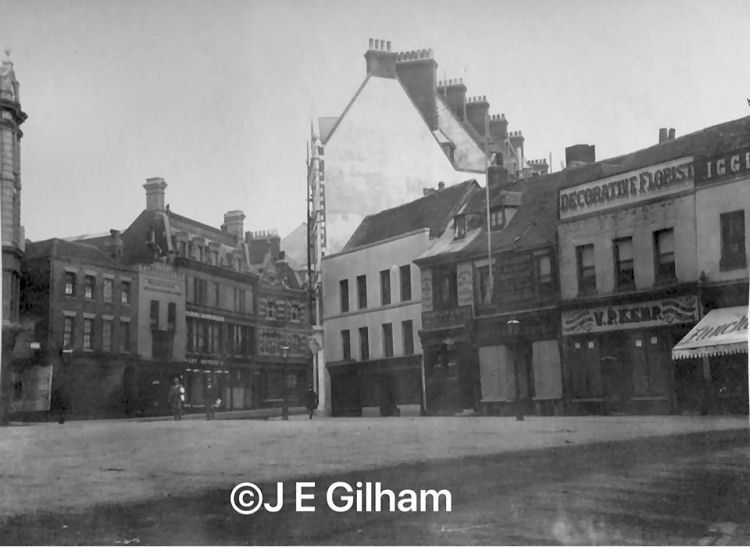
Above photo, date 1890s. |
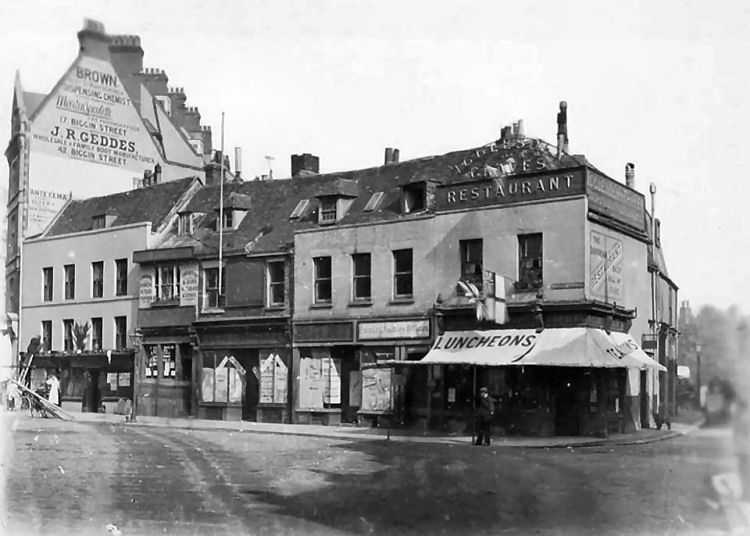
Above photo early 1890s, kindly sent by Paul Wells. |
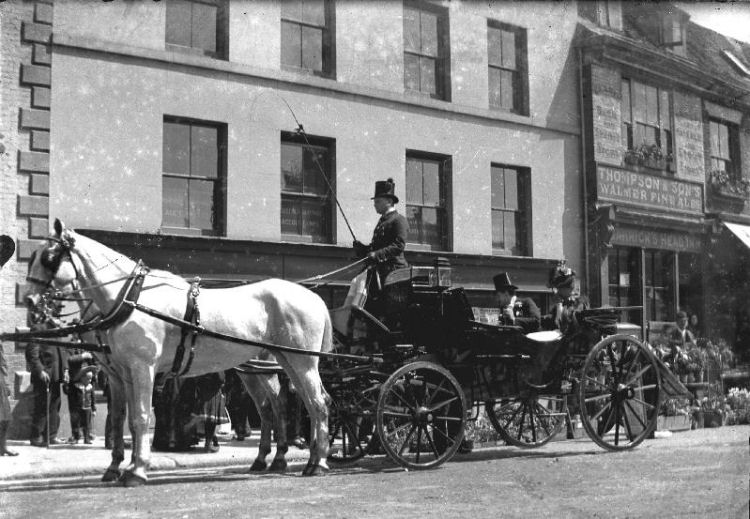
Above photo kindly supplied by Jeanette Harper, c/o Jackie Bowles of the
Louise Armstrong. Date 1900. |
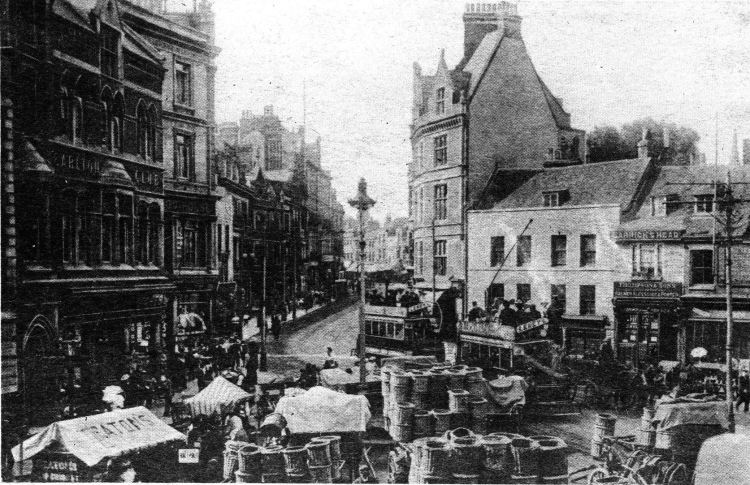 |
|
Another market day scene in the Market Square, this
time in the early days of the Corporation Tramway system - note the open
top trams. On the left is the Carlton Club, with the International
Stores on the ground floor and, next door, Waterloo House where Hart's
had their outfitters business. On the right are Worsfold and Hayward's
estate agency offices, the tiny Garrick's Head public house and the
saddler's shop of George Lester.
Information taken from John Bavington Jones' book "A
Perambulation of the Town, Port and Fortress of Dover", 1906. (Reprint
in The South Kent Gazette, July 4th, 1979. |
|
Article appeared in the Dover Mercury, 24 July 2003. By Joe Haman.
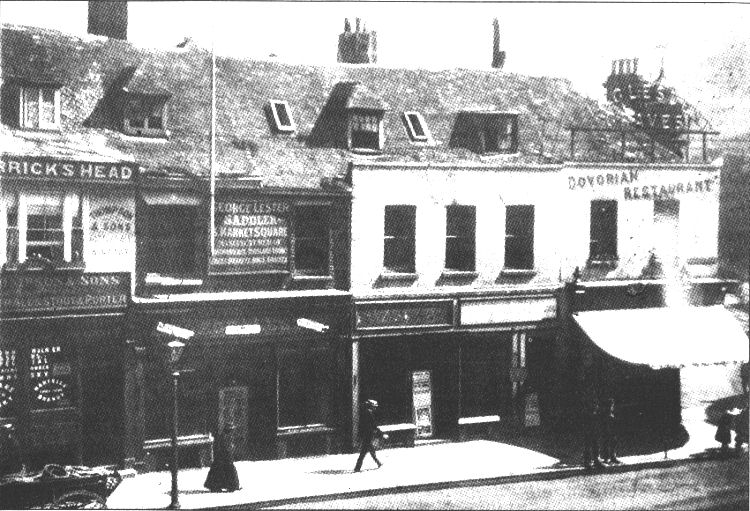
Old bones uncovered.
THIS is a view of the north side of the Market Square about 1900.
It shows the Garrick's Head on the left, and next door George Lester, the
saddler and harness-maker.
Then we come to Miss Coleman, a milliner, with offices above including
Vernon Shone, an estate agent, who moved to King Street. My wife Rosa
Harman worked for him in the 1930s.
The Dovorian Restaurant was rebuilt when the site was cleared to build
Lloyds Bank in 1905.
When they were excavating for the bank vaults they exposed the crypt of
the old St Peter's Church with its collection of bones from the old
cemetery.
It was decided to give them a decent burial in St Martin's Church, and
the Bishop of Dover conducted a special service in 1905.
This collection of bones mystified diggers in more recent years.
Joe Harman.
|
Evidentially this Inn was named after a great-nephew of the actor who
worked nearby.
Jabez Vinall served in 1853-54 when only ale or beer was sold. It is not
known if he was the first. The premises had been a tailor's shop up to
1830. The spirit licence was granted in 1863 and four a.m. opening was
allowed from 1872 but on weekdays only.
|
From the Dover Telegraph and Cinque Ports General
Advertiser, Saturday 27 May, 1854. Price 5d.
DOVER PETTY SESSIONS
Jabez Vinall, landlord of the "Garrick's Head," Market Place, was
fined in the mitigating penalty of 40s. and costs, for suffering persons
of bad character to assemble at his house.
|
|
From the Dover Express and East Kent Intelligencer, 19
March, 1859.
SERIOUS CHARGE
George Solley, a large, powerfully built man, who described himself
as a market gardener living at West Langdon, and whose eyes were sadly
blackened, was charged with assaulting John William Sharp, a labourer,
and breaking his leg on the previous Saturday night. It appeared that
the complainant was unable to attend, being confined to the hospital
from the effects of the injuries he had received.
John Wheeler, a shoemaker, living in Last Lane, examined - I was at
the "Garrick's Head" public-house, in the Market Place, on Saturday
evening. I saw the prisoner and several other men there. Among them was
the man Sharp. The prisoner was drunk and very quarrelsome. He wanted to
fight with every one in the room. Several endeavoured to persuade him to
sit down, but he would not, and at last one man got up and said, "If you
want your hide loosened, I'll loosen it for you." (Laughter). That was
not Sharp. Upon that the prisoner left the room and went down the
passage and stood in front of the bar. I did not leave the room at the
same time; but in a short time afterwards, on hearing a disturbance, I
went down to the bar. I then saw a man named Boorman bleeding from the
mouth, and the prisoner lying on the ground. Prisoner said, "Let me
stand up and I'll stand a quart of beer," and presently added, "There,
let me get up, and I'll stand a gallon." (Laughter.) Upon that some
people who were near him lifted him up. He then went behind the bar, and
after a good deal of persuasion he left the house and went into the
street. Sharp and his wife quitted the house very shortly afterwards,
when prisoner made up to them. Sharp was speaking to his wife at the
moment, and had got his head turned round, when prisoner caught him
across the chest and tripped him up with his foot. Both men fell heavily
to the ground, the prisoner coming on top of Sharp. The people near
picked Sharp up and carried him into the house, and found that his leg
was broken. There had been no quarrel between Sharp and the prisoner;
all that Sharp had done being to request Solly to sit down when he was
creating a disturbance up stairs. Solly and Sharp left the room about
the same time. I cannot say which quitted first. When I got down stairs
Sharp was standing by the side of the bar near to where the landlord was
serving. Sharp did not appear as if he had been struggling or fighting
with any one.
The prisoner, who had no questions to ask the witness, was remanded
for a week.
The defendant was informed that bail would be accepted for his
appearance if he could procure it.
|
|
From the Dover Express and East Kent Intelligencer, 12
September, 1863.
ANNUAL LICENSES
A spirit license was granted to Stephen Austen Hammond, of the "Garrick's
Head," Market Place.
|
|
From the Dover Express and East Kent Intelligencer, 23 August, 1872. Price 1d.
APPLICANTS UNDER THE NEW LICENSING ACT
Mr. Coleman applied on behalf of the landlord of the “Garrick's Head,”
Market Square, for permission to open his house at four instead of five.
The applications were ordered to stand over till the next licensing day.
|
|
From the Dover Express and East Kent News, Friday, 11 August, 1889. Price 1d.
DISGRACEFUL CONDUCT
Rose Beecham was charged at the Police Court on Monday, before F. S. Pierce,
E. Bottle, and M. Pepper, Esqrs., with being drunk and disorderly and using
obscene language in Cannon Street on Sunday night. Police-constable Knott
said that on the previous evening shortly after ten he was in Cannon Street,
and saw the prisoner, who was singing an obscene song, running to and fro on
the pavement. She refused to go away, and so he took her into custody, put
her on the ambulance and took her to the station. She continued to use the
most disgusting language all the time. Mrs. E. Bailey, of the “Garrick's
Head Inn,” said the prisoner came into the bar on Sunday evening the worse
for drink and asked to be served. Witness refused and ordered her out of the
house. She then took up a glass of beer and drank it. She was ejected from
the house by the Police. The Superintendent of the Police said she had been
sent to the prison on the 4th July for seven days on a similar charge. On
arrival at Canterbury she was recognised as an old offender. She was sent to
prison for 14 days.
|
|
From the Dover Express and East Kent News, Friday, 13 February, 1890. Price 1d.
A SISTERS QUARREL
Amy Panteney was summonsed by Elizabeth Bailey, for assaulting her on the
2nd February.
Mr. T. Lewis appeared for the plaintiff.
Elizabeth Bailey said that her husband kept the “Garricks head,” in the
Market Square. The defendant was her sister, and lived at 2, Tower Hill.
Some communication had been made to her by Mr. Hatton. On Monday last, she
went to a house near her sister's and being up there she called at her
house, but she was not at home. She was told that her sister was at the
“King William,” and she went there and asked to see her, and she ultimately
came out. She asked the defendant what she had got to curse her limbs for,
and the defendant told her if she did not hold her tongue she would hide
her, and hit her in the throat breaking her brooch, and also struck her in
the right eye. As soon as it was done she went to Dr. Best, and has been
under his care ever since. She could not see from here eye yet.
Alfred Hatton, in the employ of the Steam Laundry Company, and living on the
premises, said that before Christmas defendant was living there, and she
told him something about her sister.
The Magistrates dismissed the case.
|
|
From the Dover Express and East Kent News, Friday, 6 March, 1890. Price 1d.
STEALING A SHAWL
Stephen Ayres was charged with stealing a woollen shawl from the “Garrick's
Head,” value 8s. 6d.
Elizabeth Bailey, wife of William Bailey, who keeps the “Garrick's Head” in
the Market Square, said that the prisoner came into their house the previous
afternoon with another man. Whilst they were in the house, she went to
Castle Street to buy some fish, and on her way back, about five minutes
afterwards, she met the prisoner by Mr. Igglesden's, and spoke to him. She
then went indoors, and prisoner turned round into Church Street. There was a
back-way to their house which led into Church Street. Previous to going up
Castle Street she went into the market, and left her shawl on the table in
the back room before she went; and on returning from Castle Street she found
that her shawl had gone. Anyone going to the rear of the house would have
gone through the room where the shawl was. She sent for the prisoner, and
asked him if he knew anything about the shawl, and he said that he didn't.
When her husband came in, she told him, in the presence of the prisoner, of
her loss, and he went to the Police Station. The prisoner then said that he
had seen a woman with it that morning, but she told him that she only took
it off about a quarter past two. Prisoner said he thought he could find it,
and left the house; he returned in about twenty minutes with the shawl, and
he said he bought it off a woman for sixpence, at a lodging house at the top
of Durham Hill. A person might take the shawl from the room and throw it
over the wall at the back, and go round Church Street and get it.
Alexander McQueen, a boy 13 years of age, living at the “Garrick's Head,”
said that he saw prisoner come into the house whilst Mrs. Bailey was out,
and go out the back. The prisoner came back, and went straight out, he did
not notice whether he had anything or not.
Eliza Wellard said that she kept a lodging house at Bowling Green Hill. The
prisoner did not come there at all. She was at home, and must have seen him
if he did.
Sarah Pay said that her husband kept the “Half Moon” public house in Blucher
Row. The prisoner came to their house about three o'clock, and brought the
shawl (produced) and asked to leave it for a short time. He came for it
about a quarter of an hour afterwards.
Police-constable Knott said that he went in search of the prisoner, and
ultimately found him at the “Half Moon” at quarter past ten. He took him to
the Police Station, and on the way there he said that he received the shawl
from a woman he did not know, but thought he should if he saw her again.
Prisoner pleaded guilty.
The Magistrates sent him to prison for one month with hard labour.
|
It became three thirty in 1874. That
concession was still held after 1900. I did see a "Garrick's Arms" reported
in 1878 and have presumed it to be the same. I could find no licensee after
Charles Simmonds in 1895-03.
|
From the Dover Express and East Kent News, Friday, 1 July, 1904. Price 1d.
THE MARKET SQUARE DEADLOCK
CASE BEFORE THE COURT OF APPEAL
LLOYDS CAN START BUILDING
On Saturday in the Court of Appeal, High Court of Justice, Lord Justices
Vaughan Williams, Roberts and Cozens-Hardy had before them the case of
Thomson and Sons, Ltd., Lloyds Bank, which was an appeal from an order
of Mr. Justice Joyce of November 5th, 1903, by the defendants.
The action was by the plaintiffs, the owners of the “Garrick's Head,”
Market Square, Dover, against the defendants, the owners of No's 6 and
7, Market Square, for an injunction to restrain the defenders, their
servants, and agents from erecting or permitting to remain erected and
buildings on the site of their premises as such a manner as to interrupt
the full access of height to the plaintiffs' windows as on the same has
hitherto been enjoyed and for damages.
The plaintiffs' case is that the defendants' proposed buildings would
naturally interfere with the light coming to certain of their windows.
The premises of the plaintiffs and the defendants adjoin and part of the
plaintiffs consent of an open passage and a tap-room alongside of it
which are upon the ground floor and the rooms over them. The windows of
these rooms abut onto an open yard which is also part of the plaintiffs
premises. The highest part of this buildings off the defendants did not
exceed 40ft from the ground level. The plaintiffs and their predecessors
in total had enjoyed without interruption for more than 20 years prior
to the commencement of this action the full access of lateral light to
the windows of these rooms over the defendants buildings, and the
windows were ancient light. Defendants plaintiffs said intended to put
down their buildings and erect new buildings on the site carrying them
to a height of 60ft, and if this were done the light to plaintiffs
windows named would be materially obstructed, and it would be necessary
to use artificial light. Plaintiffs would suffer in consequence.
Defendants in their defence stated that as part of their proposed new
building which could in any way effect the access of light to plaintiffs
windows was to be as high or nearly as high as 60ft. The proposed main
wall was to be of a height of 31ft 6in, above ground level, and was to
be 3ft further south and away from the plaintiffs windows than the
existing back wall. The ridge or roof would rise to a height of 49ft,
but would be so sloped and set back from the main wall at the eaves so
as not to interfere with the access of light to plaintiffs' windows. The
only parts of the proposed buildings which would approach to a height of
60ft was a small turret at the south-eastern corridor, which would not
have any effect on the access of light to the windows. If there was any
obstruction which the plaintiffs did not admit it would be lateral
obstruction of an insignificant and immaterial character, and in such as
to cause any appreciable damage to plaintiffs.
Mr. Justice Joyce, in granting the plaintiffs an injunction and ordering
the defendants to pay the costs of the action said in his opinion none
of the lights coming to the plaintiffs premises could be spared. The
obstruction to the plaintiffs light would be purely lateral, as the
defendants' witnesses had admitted, and the effect of the defendants
buildings would be to interfere with the plaintiffs lights to some
extent. All plaintiffs' windows got their light from a kind of wall, and
he was satisfied that it would be very much darkened if the defendants'
buildings were erected, and there would be an obstruction to divert
sunlight to the plaintiffs' windows during a part of the day. Such
obstruction to the plaintiffs' ancient light would not be trivial, but
would be such as to justify the Court granting the plaintiffs an
injunction.
From the decision the defendants now appealed.
Mr. Younger, K.C. and Mr. C. V. Sargent represented the applicants and
Mr. Hughs K.C. and Mr. McSweeney the respondents.
Mr. Younger was addressing the Court on behalf of the appellants when
the further hearing was adjourned till Monday.
On Monday the hearing of this case was resumed.
At the conclusion of the arguments the Court allowed the appeal of the
defendants with costs.
Lord Justice Vaughan Williams said this action was tried before the case
of Colls v. Home and Colonel Stores was decided by the House of Lords.
Of course the Council engaged in the case directed attention of the
witnesses to the question of which were material as regards to the law
suit was declared to the Court of Appeal in the Colls case. The decision
there was merely given upon the basis that there was a right of light
and a right of property which if substantially violated disturbed the
person whose right had been thus related to a injunction. That being the
proper question to be enquired into at the time this action was tried
upon that basis. But they knew that according to the decision of the
House of Lords they must admit that the real question to be asked was
whether the effect of the defendants' building was to diminish the light
and as so as to sensibly effect the occupation of the defendants
premises and make them unfit for occupation. This was the matter they
now had to deal with. Under these circumstances the rest was not a trial
of the real circumstances to be tried. It had been suggested that the
case should go to a surveyor for his findings on the general view of the
case, but this suggestion was not accepted. His Lordship was not
satisfied that the plaintiffs had made out such a case as to justify the
Court giving them an injunction and looking at the model he was not
prepared to say that the plaintiffs would make out their case. Under
these circumstances the appeal would be allowed with costs. If the
defendants went on with their buildings they did so at their own risk
and if they did damage they must hear the consequences.
Lord Justice Roberts continued and said that the parties had left the
case in their hands. They would decide in the defendants favour. Lord
Justice Cozens-Hardy agreed.
|
Efforts were made in 1913 to transfer a licence from one of the closed
pubs in Beach Street to this address but it was not allowed. I have to
suspect my own notes there because other factors suggest that demolition
would have taken place in 1906 in preparation for the erection of Lloyds
bank.
An outlet of Thompson which was first licensed about 1830.
1905 saw the area cleared and Lloyds bank built.
LICENSEE LIST
STOKES Robert 1851+ (only mentioned as blacksmith age 37 in 1851 ) )
VINALL Jabez 1853-54

HAMMOND Stephen Austin 1858-Oct/72


COLEMAN 1872
BUSHELL George 1872-Aug/84
 (age 44 in 1881
(age 44 in 1881 ) )
  
MOFFATT W 1884
BAILEY William 1889-91+ (age 45 in 1891 ) )
 
SIMMONDS Charles Ernest 1895-1903+
 (age 43 in 1901
(age 43 in 1901 ) )
     
 From Melville's Directory 1858 From Melville's Directory 1858
 From the Post Office Directory 1874 From the Post Office Directory 1874
 From the Post Office Directory 1882 From the Post Office Directory 1882
 From Pikes Dover Blue Book 1889 From Pikes Dover Blue Book 1889
 From the Post Office Directory 1891 From the Post Office Directory 1891
 From Pikes Dover Blue Book 1895 From Pikes Dover Blue Book 1895
 From the Kelly's Directory 1899 From the Kelly's Directory 1899
 From the Post Office Directory 1901 From the Post Office Directory 1901
 From the Post Office Directory 1903 From the Post Office Directory 1903
 From the Kelly's Directory 1903 From the Kelly's Directory 1903
 From the Dover Telegraph From the Dover Telegraph
 Census Census
|







